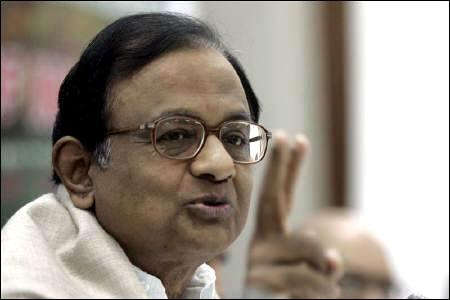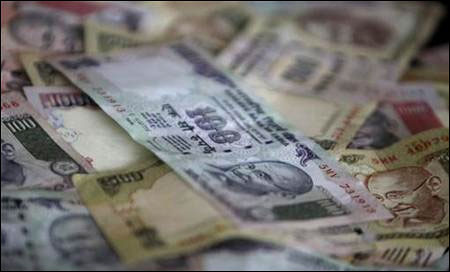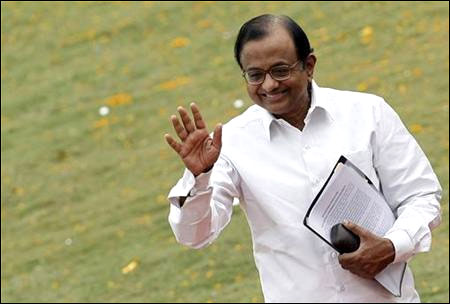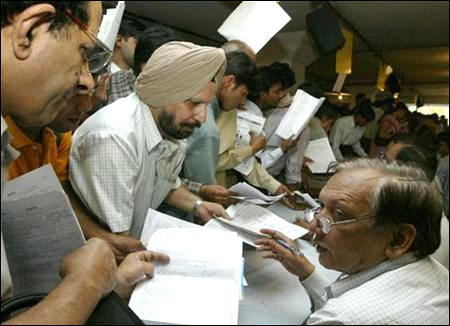Photographs: Danish Ismail/Reuters Vrishti Beniwal in New Delhi
Finance Minister P Chidambaram is planning to tighten the tax network. There is a plan to revive the large taxpayer units (LTUs) set up by him in 2006.
The finance ministry may make it mandatory for some companies to approach LTUs for all matters related to central excise, service tax and income tax, or corporation tax. While this is expected to reduce the tax compliance cost and delays for "honest taxpayers", evaders will find it difficult to dodge the taxman.
Currently, LTUs function in Bangalore, Chennai, Mumbai and Delhi, but the scheme has not been successful as not many taxpayers volunteer for fear of closer scrutiny. For instance, in Mumbai, only 39 taxpayers have registered with the LTU.
Click on NEXT for more...
Chidambaram sharpens tax axe for the big fish
Photographs: Vivek Prakash/Reuters
Those paying excise or service tax in cash of over Rs 5 crore (Rs 50 million) or income tax/corporation tax of over Rs 10 crore (Rs 100 million) are eligible to register with LTUs. Now the finance ministry may consider extending the scheme to other cities while making it compulsory for some big taxpayers by raising thresholds. A plan to open an LTU in Kolkata is in the works.
"A proposal to make LTUs mandatory is under consideration," said a ministry official. Another official said the performance of LTUs had not been satisfactory and there was a need to revive the scheme.
The Shome panel on General Anti-Avoidance Rules (GAAR) has also suggested making LTUs compulsory for a specified class of taxpayers in line with the international practice. Considering the high threshold of tax benefit (Rs 3 crore in a year) for the invocation of GAAR, the majority of cases might come under LTU, it said.
Click on NEXT for more...
Chidambaram sharpens tax axe for the big fish
Photographs: Adnan Abidi/Reuters
Earlier this month, Chidambaram had asked officers to focus on low taxpaying sectors to add an additional Rs 30,000 crore (Rs 300 billion) to the revenue kitty.
The minister said though the applicable tax rate for corporations was 30 per cent, the effective tax rate was just 24 per cent and even lower in some sectors. He said instead of randomly going after taxpayers, most of whom duly paid taxes, the department should focus on those below-average sectors to see whether the average could be raised for greater collection.
LTUs act as a single-window facilitation centre for entities to get assessed for all kinds of central taxes. The concept was introduced to assist large taxpayers in filing of documents, refund claims and settlement of disputes. As LTUs handle cases of companies having a presence in several locations, the ministry believes these can play a crucial role in the tax scrutiny of large taxpayers through closer coordination between the income tax and excise departments.
Click on NEXT for more...
Chidambaram sharpens tax axe for the big fish
Photographs: Kamal Kishore/Reuters
"This enables in-depth analysis of the finances of big corporate houses and helps prevent tax evasion. The LTU may become more effective if the audit cycle of income tax, service tax and excise is aligned," said a White Paper released by the ministry on black money some time ago.
Though all three departments are included under LTUs, they scrutinise different accounting periods at the same time, which reduces the scope for simultaneous scrutiny and examination of the assessee.
Analysts say a reason for the lukewarm response could be scepticism among taxpayers it might go against them. "There is a perception large taxpayers may be asked to pay more at LTUs. They can make it mandatory from a compliance perspective but the intention should be to give them better service," said Neeru Ahuja, partner, Deloitte.
As the government is trying to introduce a Goods & Services Tax in the country, the scope of LTUs may be widened to cover state taxes too. That may require better IT infrastructure and a bigger team of officials to handle more taxpayers.






article